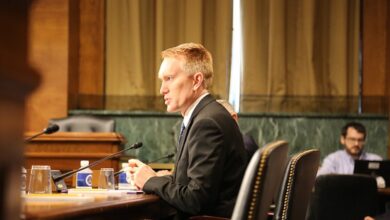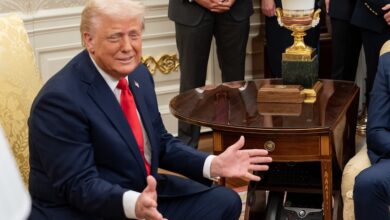Democrats using faith as weapon in nomination hearings
Is the new rule of Democrats in nomination hearings that people of faith need not apply? Questions thrown at people of faith by Democrats concerns religious leaders who are now warning lawmakers over the unconstitutional practice.
After the Nov. 2018 elections in which Democrats won back control of the House, religion is being referred to as a disqualifier for public office. The line of questioning has been compared to an inquisition and leaves many well-qualified men and women, with long and respected careers of public service or business, wondering if Christians are now second-class citizens.
“The weaponization of religion means: the use and exploitation of faith for partisan political ends, in terms of political warfare,” said Rev. Eugene Rivers, Founder and Director of the Seymour Institute for Black Church and Policy studies.
Religious Bigotry Hints at a Larger Problem
In December, Democrat Senators Kamala Harris, now a presidential candidate, and Hawaii’s Mazie Hirono questioned a federal judicial nominee about his membership in the Knights of Columbus, the well-known Catholic service organization.
They asked Brian Buescher whether he shared the groups “extremist” values and if he would be able to judge certain cases fairly.
“They were taking shots at Catholics. It doesn’t have to be the Knights of Columbus. They were taking shots at Catholics regarding pro-life and their views on marriage, OK that’s the bottom line,” Rev. Rivers said.
“This was a case of clear ideological bigotry, it was unfair and it is part of a larger problem that exists in this society,” he continued.
Many Examples of Bias
In February 2019, Democrat Sen. Cory Booker questioned the personal religious views of Naomi Rao, President Trump’s nominee to replace Judge Brett Kavanaugh on the DC Circuit Court of Appeals.
Booker asked if the nominee about the Bible’s view on sin in regard to homosexuality.
“Do you believe they are a sin?” Booker followed up. When Rao declined to answer, he pushed her again: “So you’re not saying here whether you believe it is sinful for two men to be married. You’re not willing to comment on that?” Booker pressed.
“My answer is that these personal views are ones that I would put to one side, whatever my personal views are on this subject, I would faithfully follow the precedents of the Supreme Court,” she replied.
Booker also asked her how many of her law clerks have been LGTBQ (“I’ve never been a judge so I’ve never had a clerk”) then demanded to know how many of her employees are gay.
“I don’t know the sexual orientation of my staff,” she said. “I take people as they come, irrespective of their race, ethnicity, sexual orientation.”
Questioning judicial nominee and Notre Dame law professor Amy Coney Barrett in late 2017, Sen. Dianne Feinstein infamously declared “The dogma lives loudly within you” regarding the nominee’s Catholic faith.
Sen. Ted Cruz (R-TX) called out Sen. Booker and his fellow Democrats, saying that the Judiciary Committee shouldn’t be a “theological court of inquisition.”
“We’ve seen a growing pattern among Senate Democrats of hostility to religious faith. I have to say, I was deeply troubled a few minutes ago to hear questioning of a nominee, asking your personal views on what is sinful. In my view that has no business in this committee. Article Six of the Constitution says there should be no religious test for any public office,” Cruz said.
Rivers says members of all faiths should defend religious liberty.
“I should be free to believe in my God or to believe in no God. But in either case, I should not be subjected to some ideological test that is used as the criteria or the basis for assessing my right to engage in public life,” he said.
Faith in Politics
In 1960 democrat John F. Kennedy worked to convince Americans that he could be both a good Catholic and a good public servant.
“If this election is decided on the basis that 40 million Americans lost their chance of being president on the day they were baptized then it is the whole nation that will be the loser,” Kennedy said during a speech to the Greater Houston Ministerial Association.
Rev. Rivers says if certain senators refuse to see the good contributions from people of faith in confirmation hearings, they should at least commit to upholding the Constitution.
US Constitution: No Religious Tests
Article 6 states: “No religious test shall ever be required as a qualification to any office or public trust under the United States.”
The Senate passed a resolution at the beginning of the year saying it would be unconstitutional to consider membership in the Knights of Columbus disqualifying criteria for public office. It passed unanimously.
“In this, we are simply reaffirming with President Kennedy, and with countless other Americans across 230 years, Protestant and Catholic, Jew and Muslim, Hindu and Buddhist, Agnostic, Atheist, and more. We are simply reaffirming the idea that America is big enough for disagreements,” said Sen. Ben Sasse (R-NE).
In 1960, then-candidate Kennedy responded to bigotry with a warning that Rev. Rivers echoes today.
“For while this year it may be a Catholic against whom the finger of suspicion is pointed, in other years it has been, and may someday be again, a Jew, or a Quaker, or a Unitarian, or a Baptist,” Kennedy said in his Houston speech.
“Today, I may be the victim, but tomorrow it may be you until the whole fabric of our harmonious society is ripped apart at a time of great national peril,” he continued.






